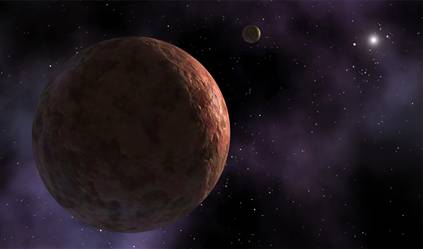March 17, 2004
A 10th Planet?
For years when I was young I was fascinated by the planets and the solar system. This has led to a deep interest in cosmology and relativity, but still is based on those majestic other worlds that, in space terms, lie right in Earth's own backyard.
This week's announcement of the discovery of a 10th "planetoid" -- dubbed Sedna for an Inuit goddess because it is so cold -- orbiting in an eliptical path many millions of miles outside Pluto throws everything into chaos. Pluto's Planet Status Could be Jeopardized by Sedna Discovery [Yahoo! News]. The mini-planet has an eccentric 10,500-year orbit that ranges between 8 billion and 84 billion miles (12.8 billion and 134 billion kilometers), which is much farther away than the existing nine planets and an outlying ring of frozen cosmic leftovers known as the Kuiper Belt.

For decades after Pluto's discovery, no other objects were discovered beyond Neptune. In recent years, however, other round objects about half Pluto's size have been detected in the Kuiper Belt, much closer than Sedna. And Sedna itself is so far from the Sun that if you were standing on the surface of Sedna today, and you held a pin at arm's length, you could cover up the entire Sun with the head of that pin.
So is this new discovery a planet or not? The International Astronomical Union is set to decide by establishing standards for what constitutes a planet (size, distance from the Sun, shape of orbit, etc.) I tend to agree with Michael Brown of CalTech, who first spotted Sedna. "Either Pluto is not a planet, or many other things are planets," Brown said today. "Which is a better choice? I want my planets to be more special, not less special, so I favor Pluto not being a planet. Emotionally, though, I have to admit that I have grown up thinking Pluto this special odd-ball planet at the edge of the solar system. While I now know scientifically that Pluto is less special, it's still hard to let go."
 Posted by glenn
Posted by glenn

Comments